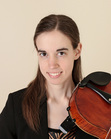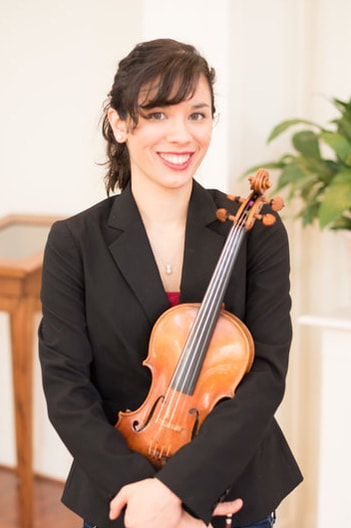
Q: Why did you start the violin?
Because I wanted to play. My parents always had classical music on in the house when I was a kid, so I knew what a violin was and liked the sound of it. I used to watch the Nutcracker every year at Christmas - and actually, constantly through the year when I was 2, much to my parents' chagrin. Although some of that might have been because I also insisted that they dance around the living room with me to the music. So, I loved music, I loved the sound of the violin, and when the opportunity to start playing came up, I took it.
I started playing at age 9, in my public school orchestra. I had a kind and wonderful teacher who saw that my interest extended beyond class at school and made sure my parents put me in private lessons.
What makes you want to teach violin?
I want to teach violin because I love the violin and I love kids. I love the challenge of figuring out which pieces of information or way of explaining things will get through to someone. Every student is different, and needs different things from me in order to understand. I love violin. I absolutely reject the idea that classical music is dead, and I want to help create the next generations of musicians and music lovers.
What teaching success are you most proud of?
I'm proud of all my students. Little victories make me inordinately happy. The day someone comes in and starts at the frog without me reminding them. The day one of my kids made a bowhold without excessive tension. I rejoice in the small things. However, a recent experience I had was having a student featured on the local news, performing the Star Wars theme. That was pretty cool.
What musical success are you most proud of?
Your DMA chamber recital! Our quartet worked so hard this last year - actually, our quintet, for the Brahms - and I'm glad that everything came out the way it did. We really accomplished a lot, and we all still love each other, so I'd call it a success. Blog readers can hear some of the recital over here on my media page.
What non-musical success are you most proud of?
This is a tough one! I like to challenge myself to constantly keep growing, and I have a lot of interests, so it's hard to pick just one. I'll name a few. One is striking out 19 batters in one softball game, way back when I was 13. I'm still pretty proud of the fact that I got a perfect score on the verbal section of my SATs. I learned enough Italian to be able to order gelato without switching to English when I visited Italy a few years ago. Also, I am proud that I drove my own moving truck from Baltimore to DC a few weeks ago and didn't hit anything or break any of my things.
What is your favorite part of making music?
Chamber music. I'd play it all day, every day, if I could. To me, it's the perfect blend of solo and ensemble playing. It's so demanding in terms of how much you need to give, and in how you relate to other people. In solo music, you're in the driver's seat. You have to negotiate with your pianist or your orchestra, but ultimately, it's your show. In orchestra, the conductor's word is law. But in chamber music, it's a collaboration. You have to really learn how to cooperate with other people and problem-solve in creative ways. And also, the repertoire. The string quartet repertoire is some of the most amazing music out there.
What are some of the benefits of learning the violin? Have you noticed these in yourself?
Violin is awesome. You learn so many things. You learn to coordinate your body in a way it was never designed to do. You learn how to read music. You develop a sense of rhythm (although sadly, this does not automatically translate into being able to dance well). You learn your own strengths and flaws very quickly. You also learn how to take something that you feel inside of you and communicate it to other people. That's a very powerful thing, that I think a lot of people (including me) can forget from time to time when they get so overwhelmed by this tremendously difficult thing that you're trying to learn. But that's the ultimate goal. To communicate feelings, to create feelings in your listeners.
What is the hardest part of learning the violin, and how can you work to overcome this?
Everything. Everything is hard about the violin. And the way you overcome this is by opening your violin case, every day, and remembering everything your teachers have told you, and listening and observing yourself carefully when you practice. And you do this, every day, for years. Eventually it gets a little easier, but it takes constant, diligent, disciplined work. It's tremendously rewarding, but it is really hard. Which actually makes it more rewarding, because I think it would be boring if it were easy.
What is some of your favorite music to listen to?
I've become a lot more open in the last few years about what I listen to, so I will at least try to listen to just about anything. I love Beethoven. A recording of Bernstein conducting the Ninth Symphony was the first CD I ever owned. I love string quartets - so, Beethoven, Shostakovich, Smetana, Dvorak, Haydn, Mozart, etc, etc, etc. I love Brahms symphonies, especially the fourth one. I also like listening to lots of different recordings of solo Bach works, because they're so personal and everyone does it differently.
What’s the best concert you’ve ever attended?
Two years ago, I saw the Emerson Quartet perform Schoenberg's Transfigured Night with some other artists at the Kennedy Center. It blew me away. Also, the concert I went to where the Cleveland Orchestra and Lang-Lang played the second Chopin Piano Concerto and Beethoven's Fifth Symphony was pretty incredible.
What is some of your favorite non-classical music to listen to?
I listen to the weirdest mix of things. I listen to classical music, a lot, but there are also times when I just want something completely different. Recently I've been into Taylor Swift and Mumford and Sons. I like the band Eddie From Ohio. I like Great Big Sea, which is a Canadian celtic rock group. I also like classic singer/songwriters such as James Taylor, Carole King, and Neil Diamond, because that's what my parents listened to when I was growing up. I also adore Disney music.
What do you do in your spare time?
I sit and devise new ways for my students to practice scales. Wow, that sounds sad. I like a lot of things. I read a lot of books. Well, at least I'll read more of them now that I'm not in grad school anymore. I like going for walks and exploring new places. I live just outside of DC, which I think is one of the coolest cities ever, so I love going downtown and going to museums, walking around, going to Nats games, etc. Also, I am constantly seeking new ways to increase my level of geekiness. My friends and I just watched all three extended editions of Lord of the Rings in one day, which makes me think that a Star Wars marathon (original trilogy only) needs to be in my future. Also, I need to watch Doctor Who and Star Trek, since people sadly shake their heads when I tell them I've never seen anything Star Trek ever. Learning to do the Vulcan salute with your left hand is a great way to work on your finger flexibility for violin. I only know this because violin teachers have tried to connect with me using that metaphor and been sadly disappointed when I give them a blank look.
Who inspires you, musically and non-musically?
YOU! :-) I'm inspired by a lot of people. Musically, I'm inspired by everyone in my string quartet. You all bring such different qualities to the table and I'm inspired by all of it. Obviously, my violin teachers have always been inspiring to me. The Emerson Quartet. The Guarneri Quartet. The conductor Carlos Kleiber. The Berlin Philharmonic.
Jascha Heifetz is sometimes inspiring and sometimes depressing to me, depending on the day. If I'm feeling great, I think "Yeah, if I practice hard for another hundred years, I might sound like him!" If I'm frustrated, I think, "I should just quit now." That's when I know it's time to take a practice break and do something else.
Okay, back to inspiration. I'm inspired by anyone who's really found out who they are and have been courageous enough to show that to the world. Especially women. So, pioneers like Amelia Earhart. Stateswomen like Eleanor Roosevelt. People who fight for causes, like Michael J. Fox. He was diagnosed with Parkinson's disease when he was thirty, and instead of letting it beat him down, he founded an organization to search for a cure, has made himself the poster child for Parkinson's and is committed to raising awareness and finding ways to continue his acting career. The new Pope, Francis, because so far he has been a model of humility and he's spoken out on a number of issues all concerned less with hierarchy and rules, and more with loving each other and the world.
What can students expect studying with you?
Students can expect to learn the violin and to learn a lot about themselves in the process. I teach a lot of things - Suzuki repertoire, exercises to develop the physical of motions, etudes and scales to practice those things. Scales. Students can expect to play a lot of scales, because they're really important and learning them makes playing violin a lot easier. They can expect to learn some history, as I like to talk about the composers of the works they're playing. They can also expect to listen to a lot of music to develop their ears, and to go to concerts. Well, I encourage students to go to live concerts because there's nothing like them. Also, they will get one discounted lesson a semester, depending on how many concerts they go to. :-) I hope students will learn to love music and the violin and how to use those loves to change the world. That might be a little idealistic, but that's the dream.

 RSS Feed
RSS Feed